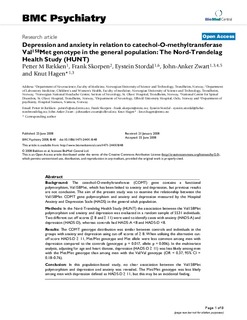Depression and anxiety in relation to catechol-O-methyltransferase Val158Met genotype in the general population: The Nord-Trøndelag Health Study (HUNT)
Journal article, Peer reviewed
Permanent lenke
http://hdl.handle.net/11250/332229Utgivelsesdato
2008Metadata
Vis full innførselSammendrag
Background: The catechol-O-methyltransferase (COMT) gene contains a functional
polymorphism, Val158Met, which has been linked to anxiety and depression, but previous results
are not conclusive. The aim of the present study was to examine the relationship between the
Val158Met COMT gene polymorphism and anxiety and depression measured by the Hospital
Anxiety and Depression Scale (HADS) in the general adult population.
Methods: In the Nord-Trøndelag Health Study (HUNT) the association between the Val158Met
polymorphism and anxiety and depression was evaluated in a random sample of 5531 individuals.
Two different cut off scores (≥ 8 and ≥ 11) were used to identify cases with anxiety (HADS-A) and
depression (HADS-D), whereas controls had HADS-A <8 and HADS-D <8.
Results: The COMT genotype distribution was similar between controls and individuals in the
groups with anxiety and depression using cut-off scores of ≥ 8. When utilizing the alternative cutoff
score HADS-D ≥ 11, Met/Met genotype and Met allele were less common among men with
depression compared to the controls (genotype: p = 0.017, allele: p = 0.006). In the multivariate
analysis, adjusting for age and heart disease, depression (HADS-D ≥ 11) was less likely among men
with the Met/Met genotype than among men with the Val/Val genotype (OR = 0.37, 95% CI =
0.18–0.76).
Conclusion: In this population-based study, no clear association between the Val158Met
polymorphism and depression and anxiety was revealed. The Met/Met genotype was less likely
among men with depression defined as HADS-D ≥ 11, but this may be an incidental finding.
